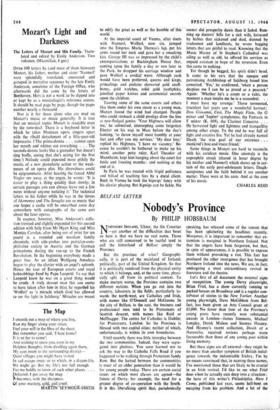Mozart's Light and Darkness
The Letters of Mozart and His Family. Trans- lated and edited by Emily Anderson. Two volumes. (Macmillan, 8 gns.)
OVER 600 letters by (and most of them between) Mozart, his father, mother and sister 'Nannerl' were splendidly translated, annotated and grouped in narrative sequence by the late Emily Anderson, sometime of the Foreign Office, who afterwards did the same by the letters of Beethoven. Hers is not a work to be dipped into or kept by as a musicologist's reference source. It should be read page by page, though the pages number nearly a thousand.
Nor is it for those alone who are mad on Mozart's music or music generally. It is true that on musical topics Mozart is readable even by the tone-deaf. There is a boyhood letter in which he takes Mantuan opera singers apart with the ribald detachment of a fifty-year-old impresario. (The prima-donna . . . cannot open her mouth and whines out everything. . . . The seconda-donna looks like a grenadier but doesn't sing badly, seeing that she's acting for the first time.') Nobody could expound more pithily the merits of a new pianoforte action or the weak- nesses of an opera plot. His shrewdness could be epigrammatic. After hearing the famed Abbe Vogler rev away at the organ, he wrote: 'It is easier to play a thing quickly than slowly; in certain passages you can always leave out a few notes without anyone noticing it.' The technical letters to his father while he was in the throes of Idomeneo and The Seraglio are so meaty that one hopes a cache will be unearthed some day somewhere with autographs of the same sort about the later operas.
In essence, however, Miss Anderson's colla- tion (revised and slightly expanded for this second edition with help from Mr Hyatt King and Miss Monica Carolan, after being out of print for ten years) is a rounded and mordant family chronicle, with side-probes into patrician-cum- philistine society in Austria and the German princedoms during the run-up to the French Revolution. In the beginning everybody made a great fuss. As an infant Wolfgang Amadeus began to play the clavier with an angel's aplomb. Hence the tour of European courts and royal hobnobbings fixed by Papa Leopold. To say that Leopold knew he was on a good thing would be crude. A truly devout man (his son seems to have taken after him in this), he regarded his `Wolfed' as `a miracle which God has allowed to see the light in Salzburg.' Miracles are meant to edify the great as well as the humble of this world.
At the imperial court of Vienna, after duets with Nannerl, Wolfer!, now six, jumped into the Empress Maria Theresa's lap, put his arms round her neck and gave her a smacking kiss. George HI was so impressed by the child's extemporisations at Buckingham House that, coming upon the family a day or two later in the Park, he dropped his carriage window and gave Wolferl a cordial wave. Although cash would have been preferred, queens and kings, princelings and prelates showered gold snuff- boxes, gold watches, solid gold toothpicks, jewelled paper knives and ceremonial swords upon the children.
Touring some of the same courts and others like them under his own steam as a young man, Mozart found the wind had changed. People who could stomach a child prodigy drew the line. at new-fledged genius. 'Your Highness will allow me,' he submitted, intercepting some forgotten Elector on his way to Mass before the day's hunting, 'to throw myself most humbly at your feet and offer you my services.' My dear boy,' replied his Highness, 'I have no vacancy.' Be- cause he couldn't be bothered to make up his mind, another petty ruler, Karl Theodor of Mannheim, kept him hanging about the court for futile and freezing months: and nothing at the end of it.
In Paris he was treated with frigid politeness and bilked of teaching fees by a ducal client. Back in Vienna he took the bigwigs' fancy with his clavier playing. But bigwigs can be fickle. No sooner did prosperity dawn than it faded. Run- ning up doctors' bills for a sick wife, harassed by babies that sickened and died, dunned by tradesmen and landlords, he wrote begging letters that are pitiful to read. Knowing that the Music Master of St Stephen's Cathedral was ailing as well as old, he offered his services as unpaid assistant in hope of the reversion. Even this came to nothing.
Yet though he begged, his spirit didn't bend. It came to his ears that the opaque and patronising Archbishop of Salzburg found him conceited. 'Yes,' he confirmed, 'when a person despises me I can be as proud as a peacock.' Again • 'Whether he's a count or a valet, the moment a man insults me he is a scoundrel. . . I must have my revenge.' Those tormented, truculent last years saw a wonderful harvest: Don Giovanni, Cosi, The Magic Flute, the G minor and 'Jupiter' symphonies, the Fantasia in F minor (K. 608), the Clarinet Concerto. . . . He harvested light and lightness and tranquillity among other crops. To the end he was full of fight and creative fire. Yet he had already named Death 'the true goal of our existence . . . mankind's best and truest friend.'
Some things in Mozart are hard to reconcile with his cerulean music. One anomaly is the coprophile streak (shared in lesser degree by his mother and Nannerl) which shows up in cer- tain of the early post-adolescent letters. Dea.th- acceptance and the faith behind it are another matter. These were at his core. And at the core of his music.
CHARLES REID






























 Previous page
Previous page